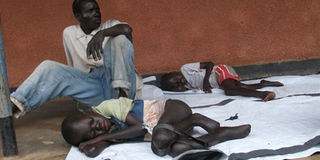From nodding syndrome to malnutrition

A man attends to his children at Atanga Health Centre, a treatment centre for nodding syndrome in Pader District, last week. Majority of the children are said to be malnourished due to lack of adequate food intake. PHOTO BY cissy makumbi
What you need to know:
GOVT EFFORTS
The government through the Office of the Prime Minister gives nodding disease affected families food rations on quarterly basis but the beneficiaries say is inadequate to sustain them.
At least Shs6 million has been given to each nodding disease affected district by the agriculture ministry for land opening as a long term solution to the food crisis.
Early last month government dispatched vans to help transport children affected by the nodding disease to treatment centres in Pader District.
More than 1000 cases were diagnosed between August and mid-December
Children suffering from nodding disease syndrome have been exposed to malnutrition, a thing that has created a fresh distress to the already suffering region. The deficiency disease has been caused by inadequate intake of food and poverty which has exposed the children to otherwise preventable deaths.
In Pader District, the in-charge of Atanga nodding disease treatment centre, Mr David Nokrachlast, last week said malnutrition among the children is a big issue as majority of them brought to the centre exhibit the signs.
“Our concern is that the parents take long to bring their children for treatment. By the time they bring them, they are already malnourished that exposes them to risks,” Mr Nokrach said.
Health officials cited those not on fortified food and sodium volprate treatment that control seizures, as the most malnourished category. They said seizures compromise their ability to eat.
Food offers
Treatment and the fortified foods supplied by the government are only administered to the children who are already at the treatment centres in Aganga in Pader District, Palabek-Kal in Lamwo District and Kitgum Hospital treatment centre in Kitgum District.
Parents have raised complaints that their efforts to have adequate food for the sick children have been curtailed by their inability to leave the children alone in treatment centres to engage in cultivation.
Ms Alice Oyella, a mother to two children suffering from nodding disease and are also malnourished, said the risk could spread to them. “We are extremely vulnerable, not only the children who are malnourished but even us the care takers because we don’t have enough food in our homes.”
More efforts
Mr Mathew Akia, the Lamwo LC5 chairperson, said unless more efforts are put in place to help the affected families through swift livelihood programmes, the situation could slip out of hand and could lead to increased deaths.
He added that sustainable nutrition programme could give more chances to the children to survive. Mr Charles Bongomin, a parent, said homes have no food. “What happens is that the children get back to their homes where there is inadequate food after getting medication from the centres,” he said.
Large areas of northern Uganda are experiencing an outbreak of nodding syndrome, a mysterious disease that causes young children and adolescents to nod violently when they eat food. The disease, which may be an unusual form of epilepsy, could be linked to the parasitic worm responsible for river blindness, a condition that affects some 18 million people, most of them in Africa.
The current outbreaks are concentrated in the districts of Kitgum, Pader and Gulu. In Pader alone, 66 children and teenagers have died.



